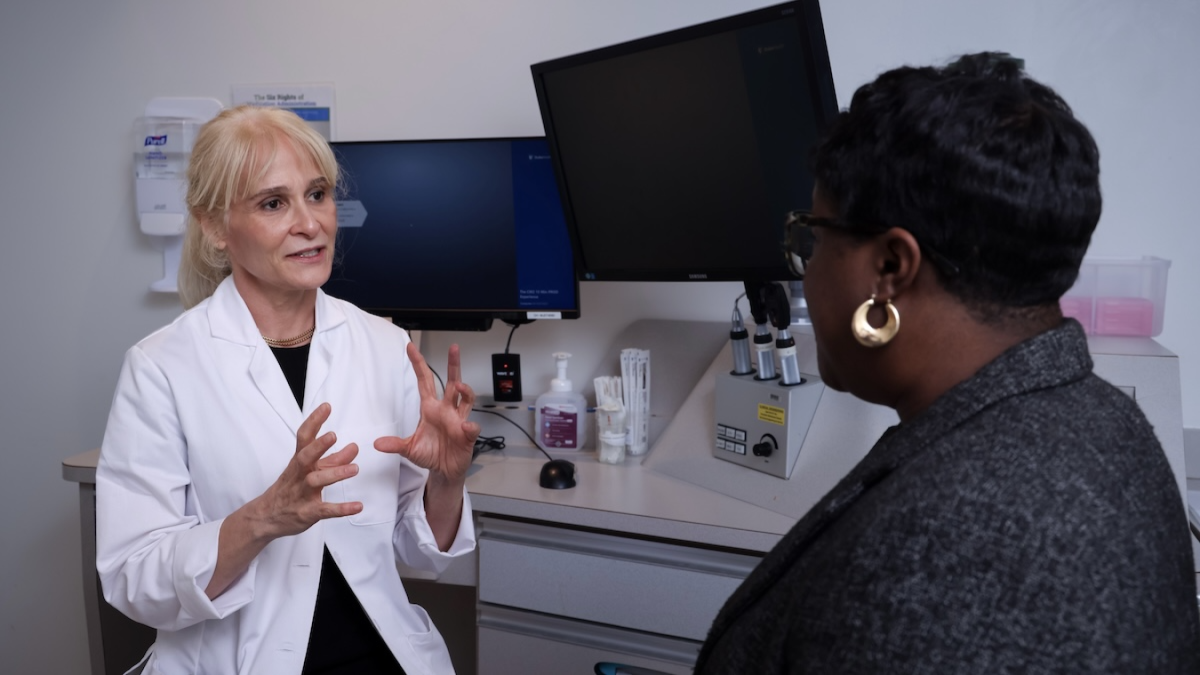The Ocular Immunology Division is dedicated to the diagnosis and management of inflammatory eye diseases. The division combines world-class clinical care, and cutting-edge research to address the full spectrum of ocular immune-mediated conditions.
The division is led by Esen K Akpek, MD, Director of Frances and C. Stephen Foster Ocular Immunology and Inflammation Center and President of the Foster Ocular Immunology Society. The comprehensive multi-disciplinary team is composed of dedicated rheumatologists, and ophthalmologists from every subspecialty, provides state-of-the-art evaluation and treatment while driving innovations in understanding how the immune system affects the eye. Through research and a patient-centered approach, the division is transforming comprehensive care for patients with sight-threatening inflammatory eye disease.
Mission
- Deliver expert care for patients with any and all inflammatory eye diseases and eye diseases in the setting of inflammatory systemic conditions.
- Investigate how the immune system affects the eye to uncover new insights.
- Translate discoveries into innovative, effective, and safe treatments that preserve vision.
- Transform the future of ocular immunology through research and patient-centered care.
- Disseminate knowledge and skills globally through training programs and scholarship opportunities to have an impact around world
Research Highlights
Pre-clinical and Clinical Research
Participated or led several recent Principal Investigator-initiated and industry-initiated clinical trials have resulted in the introduction of new medications and therapeutics to patients.
- “Role of neurotrophic keratitis versus severity of tear film and ocular surface parameters in determining the differences in corneal structure and function in patients with Sjögren’s versus non-Sjögren’s dry eye”
- P.I.: Esen K. Akpek, MD
- Goal: The goals of this investigator-initiated industry-supported study are: to determine whether dry eye is associated with reduced corneal sensation, whether reduced corneal sensation is due to the severity of the dry eye, the type of dry eye (primarily aqueous deficient versus primarily evaporative) or entirely related to the presence of SjD, and to determine whether corneal sensation is associated with ocular or systemic pain symptoms.
- “Multicenter Clinical Trial to Evaluate the Safety and Efficacy of ex Vivo Corneal Cross-linking of Donor Corneal Tissue used for Vascularized High-risk Keratoplasty.”
- P.I.: Esen K. Akpek, MD
- Goal: The goal of this department of defense-supported study is to: assess the effect of cross-linking in preventing donor graft rejection in vascularized recipient corneas.
- “Defining the Immune Cell Roles in Meibomian Gland Dysfunction in the Context of Ocular Surface Immune Diseases”
-
- R01EY021798-10 (PI: Saban) 02/01/12–3/2028
- NIH/NEI
- The major goal of this project is to investigate the role of dendritic cells in the immunopathogenesis in experimental allergic conjunctivitis.
- Blink, Lacrimation, and Nociception: Precision Mapping and Integrated Atlas Generation of Corneal Trigeminal Afferents
- U01EY034687 (MPI: Saban D et al.) 10/1/2022 - 09/30/2027
- NIH/NEI Contact PI
- The major goal of this multi-PI multi-center project is to generate a high dimensional taxonomy of the corneal afferent circuitry unravel at the molecular, spatial, genomic, physiologic, and behavioral levels. Our grant is part of an eight grant national consortia in the Anterior Segment Initiative of the NEI.
Education Highlights
- “The Role of Eye Care Providers in Diagnosing and Managing Sjögren’s Disease”, jointly sponsored by Duke University and Sjogren’s Foundation, January 2026
- Ocular Surface Educational Fellowship Program will be established in the near future
- Educate and mentor the next generation of physicians and clinician-scientists in ocular immunology, uveitis, and inflammation
Clinical Care Highlights
- Comprehensive diagnosis and management of ocular surface diseases causing pain, visual dysfunction, and reduced quality of life
- Specialized multidisciplinary clinical unit with expert corneal ophthalmologists and advanced diagnostic modalities
- Medical and surgical therapies tailored to ocular surface inflammatory and immune-mediated diseases
- Ocular surface protective devices, including Boston PROSE lenses, to heal and protect the cornea while correcting refractive errors
- Stem cell–based therapies using patients’ own cells for treatment of severe inflammatory ocular surface disease
- Advanced ocular surface reconstruction procedures for complex corneal and conjunctival disorders
- Development of biomarker-based diagnostics and personalized treatment strategies for ocular surface disorders
- Patient- and family-centered outpatient facility designed to optimize care and experience
Foster Center for Ocular Immunology
The Foster Center for Ocular Immunology is a multidisciplinary program of distinction that provides individualized care for patients suffering from ocular surface disease and is focused on basic, clinical and translational research to better understand the disease and improve treatment.
Diseases of the ocular surface can cause severe pain and highly affect a patient’s visual function and quality of life. To better serve our patients, the center has developed a specialized clinical unit where patients are examined by expert corneal ophthalmic specialists, in addition to modalities in evaluation and diagnosis and medical and surgical treatment.
The center offers ocular surface protective devices such as Boston Prosthetic Replacement of the Ocular Surface Environment (PROSE). PROSE is a unique contact lens that is custom made to protect and heal the ocular surface while also correcting refraction errors in order to simultaneously rehabilitate patients’ vision.
For further treatment, the use of stem cell based therapy has become a major area of research. With this program, the patients’ own cells can be used for the treatment of their ocular surface diseases.
The immediate goals of the center are to develop a patient and family friendly outpatient facility that optimizes patient care, establish an Ocular Surface Educational Fellowship Program, and create a research program in biomarkers of ocular surface disorders.
In the near future, the Foster Center for Ocular Immunology hopes to become a national and international leader in ocular surface diseases through leadership in basic and translational research, clinical trials, and excellent patient care.

